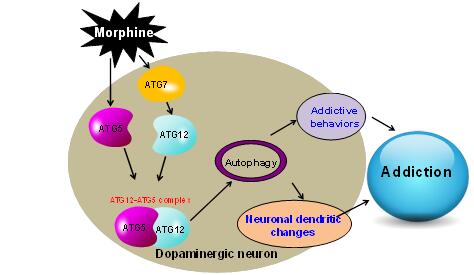Recently, a research group led by Dr. YAO Yonggang and Dr. XU Lin at Kunming Institute of Zoology (KIZ) of Chinese Academy of Sciences in collaboration with Dr. DING Yuqiang at the Tongji University, found that Atg5- and Atg7-dependent autophagy in dopaminergic neurons regulates cellular and behavioral responses to morphine (Fig. 1). This research is published online in Autophagy: http://www.tandfonline.com/doi/full/10.1080/15548627.2017.1332549.
Drug addiction is a chronic, relapsing brain disorder, characterized by compulsive drug use, sensitization and dependence. Because of the impact on health, social cohesion, crime, comorbidity, and associated neuropsychiatric abnormalities, drug addiction has become one of the biggest health problems across the world and causes an enormous financial burden on society. However, the exact mechanism underlying addiction has not been fully elucidated.
Autophagy is a lysosome-mediated degradation pathway actively involved in drug addiction. It has been reported that autophagy regulates the axonal and dendritic degeneration of neurons. Both ATG5 (autophagy related 5) and ATG7 (autophagy related 7) are required for the maintenance of axonal homeostasis. It is possible that autophagy contributes to the neuronal dendritic morphological changes and the resulting behavioral consequences from morphine exposure.
The previous study found that chronic morphine treatment can cause mitochondrial dysfunction and autophagy, and co-administration of melatonin with morphine ameliorates morphine-induced behavioral sensitization and analgesic tolerance. But how autophagy contributes to the development of addictive behaviors has not been answered.
In this study, YAO Yonggang’s Group hypothesized that autophagy of dopaminergic neurons would contribute to the alterations of neuronal dendritic morphology and behavioral responses induced by morphine.
Based on the mouse animal models, they clarified the role of autophagy in addiction, and then explored the molecular mechanism of autophagy induced by morphine. They found that repeated morphine administration led to upregulation of ATG5 and ATG7, which facilitated the formation of the ATG12-ATG5 conjugate and Atg5- and Atg7-dependent autophagy in the dopaminergic neurons.
The detrimental effects of morphine-induced autophagy could be counteracted by a specific deficiency of ATG5 or ATG7 in dopaminergic neurons, and this protected neuron function and prevented the development of addictive behaviors. Manipulation autophagy might be explored as a potential therapeutic strategy in the future treatment of drug addiction.
The study was supported by the National Natural Science Foundation of China (31671050), the Strategic Priority Research Program (B) of CAS (XDB02020003) and the Bureau of Frontier Sciences and Education of CAS (QYZDJ-SSW-SMC005).

Fig.1.A proposed mechanism of the Atg5- and Atg7-dependent autophagy for morphine addiction (Image by YAO Yonggang’s Group) (Image by YAO Yonggang’s Group)
(By SU Lingyan, YAO Yonggang; Editor: HE Linxi)
Contact Information:
YAO Yonggang
Kunming Institute of Zoology
E-mail: yaoyg@mail.kiz.ac.cn

